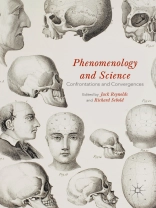This book investigates the complex, sometimes fraught relationship between phenomenology and the natural sciences. The contributors attempt to subvert and complicate the divide that has historically tended to characterize the relationship between the two fields. Phenomenology has traditionally been understood as methodologically distinct from scientific practice, and thus removed from any claim that philosophy is strictly continuous with science. There is some substance to this thinking, which has dominated consideration of the relationship between phenomenology and science throughout the twentieth century. However, there are also emerging trends within both phenomenology and empirical science that complicate this too stark opposition, and call for more systematic consideration of the inter-relation between the two fields. These essays explore such issues, either by directly examining meta-philosophical and methodological matters, or by looking at particular topics that seem to require the resources of each, including imagination, cognition, temporality, affect, imagery, language, and perception.
Jadual kandungan
Preface: Phenomenology and/or Science: Confrontations and Convergences; Jack Reynolds and Richard Sebold.- 1. ‘At Arm’s Length’: The Interaction between Phenomenology and Gestalt Psychology; Aaron Harrison.- 2. “Intrinsic Time” and the Minimal Self: Reflections on the Methodological and Metaphysical Significance of Temporal Experience; Jack Reynolds.- 3. Phenomenology and the Scientific Image: Defending Naturalism from its Critics; Richard Sebold.- 4. Enacting Productive Dialogue: Addressing the Challenge that Non-human Cognition Poses to Collaborations between Enactivism and Heideggerian Phenomenology; Marilyn Stendera.- 5. The Rest is Science: What Does Phenomenology Tell Us About Cognition; Michael Wheeler.- 6. Affect as Transcendental Condition of Activity vs. Passivity—and Natural Science; David Morris.- 7. Losing Social Space: Phenomenological Disruptions of Spatiality and Embodiment in Moebius Syndrome and Schizophrenia; Joel Krueger and Amanda Taylor Aiken.- 8. Phenomenology of Language in a 4e-World; Andrew Inkpin.- 9. Intercorporeity: Enaction or simulation?; Shaun Gallagher.- 10. Multiperspectival Imagery: Sartre and Cognitive Theory on Point of View in Remembering and Imagining; Christopher Jude Mc Carroll and John Sutton.- 11. Imaginative Dimensions of Reality: Pretense, Knowledge, and Sociality; Michela Summa.
Mengenai Pengarang
Jack Reynolds is Professor of Philosophy and Associate Head (Research) of the School of Humanities and Social Sciences at Deakin University, Australia. He has written four books:
Chronopathologies: The Politics of Time in Deleuze, Derrida, Analytic Philosophy and Phenomenology (2012);
Analytic Versus Continental: Arguments on the Methods and Value of Philosophy (2010, with James Chase);
Merleau-Ponty and Derrida: Intertwining Embodiment and Alterity (2004); and
Understanding Existentialism (2006).
Richard Sebold received his Ph D in philosophy from La Trobe University, Australia, in 2013, where he was a lecturer until 2015. He is now Head of Ethics and Global Challenges at Ormond College at the University of Melbourne, Australia. His thesis was published as a book in 2014, titled
Continental Anti-Realism: A Critique.












